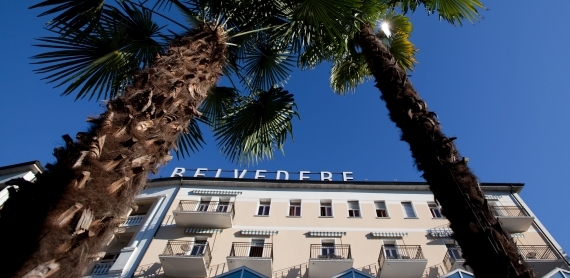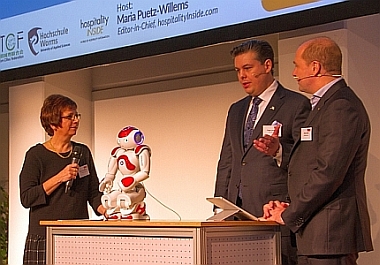
News & Stories
Eschborn. Extended project management, new clients in all segments and further European expansion: The prospects for the procurement company for hoteliers, Progros are excellent, its expansion goals are ambitious.
Locarno/St. Moritz/Milan. In Switzerland, the dissolution of the euro peg seems to be metabolised. At least in the hospitality sector. But not without paying a heavy price, while further challenges worry Swiss hoteliers: the rising cost of human resources and the lack of early snowfall in mountain destinations. The Swiss National Bank's decision to remove the euro peg has definitely been disruptive. On the other side of the Alps, beyond the Italian border, the context is different: no currency challenges here. But still some similar concerns. Massimiliano Sarti met three Italian-Swiss hoteliers – from the Swiss Belvedere Hotel Locarno, the international operator Kempinski at the Grand Hotel des Bains St. Moritz and the Italian TH Resort Schloss in Pontresina. The general managers talk about their daily challenges in business – from the implementation of dynamic pricing, RevPar losses to labour costs and the absence of snow. Meanwhile, TH Resorts closed their hotel in Switzerland.
Vienna. As of 1 May, an increased VAT rate has been in force for accommodation in Austria: The rate of VAT applied to accommodation has increased from ten to 13 percent. Right up to the moment the reform entered into force, industry representatives did everything in their power to prevent the hike. This was ultimately just as futile as efforts in opposition to measures imposed mandating the use of cash registers. Though the latter measure took aim more at the black market in small restaurants than it did in hotels. The hotel industry is now trying to keep the impact of the VAT hike within strict limits. The system itself is chaotic.
Paris. In a time of concentration and pressure in the distribution sector, general managers and hotel owners are open to any opportunity, which will result in generating more revenue without costs. To their ears, the hotel parking solution offered by the French start-up sounds like music. It allows anyone searching for a parking spot in congested city centers or airports/train stations, etc. to access hotel parking facilities, which are very often underused. The good news is, it costs hoteliers zero investment and effort.
Wiesbaden. For the first time, AccorHotels Germany is promoting a female, Daniela Schade, to the Management Board. Christopher Knable has left Katara Hospitality; Werner Knechtli now is Owner's Representative of the Kameha Grand Zurich and the Du Lac et Du Parc Grand Resort in Riva del Garda as well as the New Century Hotel Frankfurt Offenbach are operating under new managers.
Berlin. Seldom has a participant in a discussion at "ITB Hospitality Day" during ITB Berlin received such attention as was the case with Mario. Visitors would love to have hugged the 57 cm "tall" robot with mischievous eyes; at least, they all wanted to take a picture of him. The Japanese female robot ChihiraKanae seemed a bit more wilful although she had humanoid features and attracted a great deal of interest at the ITB Marketing and Distribution Day. There were many topics for discussion concerning robots and their impact on the work environment – with the sober recognition that the programmed beings are able to find their way into the hotel industry faster than anticipated. Fred Fettner provides a summary.
Wiesbaden. Franz Woegerer, chef de cuisine in Thurnher's Alpenhotel in Zuers, Austria, has never before experienced a Christmas season like the one just gone. Around a quarter of the guests in the fully occupied hotel indicated they had allergies, food intolerances or dislikes. One female guest also regularly burst into tears because she didn't like the alternative dishes suggested by the kitchen... Guests with allergies or pseudo-allergies have of late been making life in the kitchen hell. How is the hotel to react? Some interesting tips.
Duesseldorf. At the moment, there's a lot to be heard about budget hotels. They are considered highly profitable and exist without almost any F&B provision at all. Almost nobody talks of full-service hotels any more. Yet these still account for the lion's share of the sector. The midscale hotels below them are meanwhile coming under increasing pressure. 70 percent of operating costs are fixed. Where then are the cost drivers and, in the end, the earnings potentials? These can be influenced in planning, Tina Froboese says, Partner at bbg-Consulting in Dusseldorf. In her guest contribution today, she points out the focus areas - e.g. the kitchen and in work processes.
Munich. How do you keep budget fresh and alive? Especially when you expand quickly, like Motel One, to become a large international chain. The Munich-based "Low Budget Design" group leads the way: in interior design, in its lighting concept, at the breakfast table, at the bar and in its recent image video. It even dares to use the word "luxury". After all, it furnishes its "One Lounges" exclusively with expensive design originals. Daniel Mueller, Chief Operating Officer of the group, explains how the group manages this and the innovations which will soon await the guest. His statement: For a budget hotel group, Motel One has "value surplus"!
Munich. What effects do terrorist attacks have on tourism and on individual destinations in particular? The first part of this series from the last Friday provided some answers to this. Nothing seems to be able to rob the investors of their calm: The belief that it is merely a question of insurance is almost spooky and apart from that, certificates for more security in the hotels can be provided. And hoteliers hide behind the discretion that their job imposes upon them. Only the increasing extent of cyber criminal activity jolts them awake.








